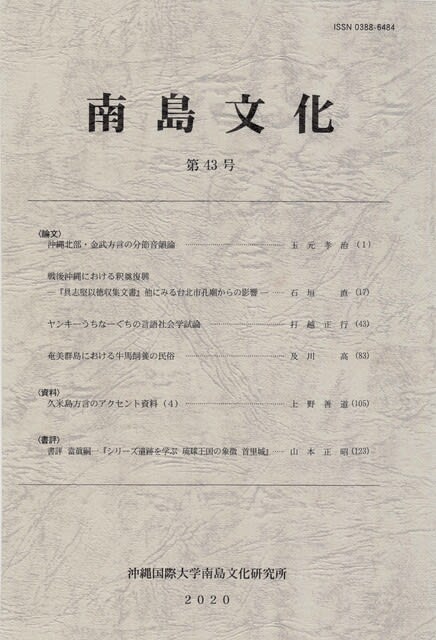■打越正行、2020年12月8日、「ヤンキーうちなーぐちの言語社会学試論」沖縄国際大学南島文化研究所編『南島文化』43号、43p‐81p.
概要
本稿は、沖縄のヤンキーの若者たちが話す「ヤンキーうちなーぐち」を言語社会学の視点から考察することを目的とする。彼ら自身がその言語を話すことをどのように意味づけており、その言語行動は彼らの集団や関係性でどのような機能を果たすのか、そしてそれは現在どのように変化しているのかについて描く。
まずは、彼らの用いる言語を考察する際に言語社会学の視点が有効であることについて述べる。それにより、言語使用だけではなく、言語行動が生じる社会的体系とその変化に焦点をあてることができる。その問題意識にもとづき、彼らの生きる地元について概観する。彼らの言語行動がなされる地元は、地域別、世代別に分化した社会というより、階層差や職業によって分化した社会である。最後に変化する言語使用の事例をもとに社会的体系の動態に迫る。
2000年代、沖縄のヤンキーの若者がヤンキーうちなーぐちを話すことは、ヤンキーとしての誇りとなり、地元で生活し働く条件であり、それを仲間集団に誇示する機能を果たした。しかしその後、建設業界の受注工事額は縮小し続け、少子化も進んだ。それにより2010年代には建築現場に彼らが定着することが困難となった。彼らが習得した言語は、学校や中間層からは距離があり、ほぼ地元つながりや建設業でのみ通用するものであった。ゆえにそれは最後の砦としての「地元からの排除」となり、彼らはその言語状況による固有の困難を経験した。
UCHIKOSHI Masayuki, 2020, An Essay on the Sociolinguistics of Yankī Uchinaaguchi, Institute of Ryukyuan Culture Okinawa International University, NANTO BUNKA, no.43, 43p-81p.
Abstract
This article aims to examine, from a sociolinguistic perspective, the “Yankī Uchinaaguchi ” spoken by young Okinawan delinquents . We will describe how juveniles attach meaning when speaking this language, the functions that this linguistic behavior serves in their respective groups and relationships, and how this is currently changing.
We will first explain the effectiveness of the sociolinguistic perspective when examining the language they employ. This approach allows us to focus not only on language use but also on the social system created by linguistic behavior and the changes to that system. With these issues in mind, we will give an overview of the local areas in which they live. These local areas in which their linguistic behavior is undertaken are communities differentiated according to class differences and occupation rather than by region or generation. Finally, we will turn our attention to social system dynamics, using examples of changing language use.
In the 2000s, the speaking of Yankī Uchinaaguchi by young Okinawan delinquents was a mark of pride in being a juvenile delinquent, a condition of living and working in the local area, and performed the function of displaying this among themselves. However, there followed a continued decline in both birthrate and the number of projects in the construction industry, making it difficult for them to establish themselves on construction sites in the 2010s. Their acquired language, distanced from school and the middle class, could be used only within local connections and in the construction industry. Consequently, this amounted to an “exclusion from the local area” that had been their last stronghold, and they have experienced the difficulties inherent in this linguistic situation.
ダウンロード
以下の資料に再録。
■論説資料保存会編、2023年9月30日、『日本語学論説資料』58(4): 352-371.















